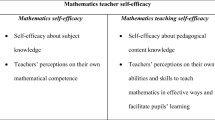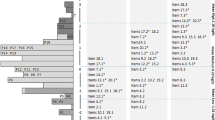Abstract
The purpose of this study was to examine the sources that pre-service teachers (PSTs) use when they construct their self-efficacy beliefs and learning goals, which compose their motivational profiles. Pre-service elementary teachers (n = 22) with different motivational profiles participated in narrative interviews designed to examine retrospectively their past experiences in mathematics and the effect of those experiences on their motivational profiles. Results reveal that participants relied on multiple sources to construct their efficacy beliefs and goals, including past performance, vicarious experiences, verbal persuasions, career goals, and the fit between participants’ views of mathematics and the nature of mathematics in their classes. While some of these factors have been identified by previous research, the contribution of the current study is to extend this research to a new population and to elaborate on these factors. Results also help refine and extend our knowledge of PSTs’ motivation and suggest ways that teacher educators could influence PSTs’ motivational profiles.

Similar content being viewed by others
Notes
There are other theories concerning expectancy theory and reasons for engagement (e.g. Eccles et al. expectancy-value model (Eccles et al., 1983)). The similarities, differences, and relationships between the different theories are not yet completely reconciled and are beyond the scope of this article.
The four motivational profiles provided in Table 1 are simply examples I created. There are many different possible motivational profiles.
The course instructors and the interviewer (myself) were not the same person. None of the participants were my students at the time of the study.
Modifications included replacing the phrase “in class” with “in my math classes” and the phrases “the work” or “my work” with “math” or “math work.” For the revised version of PALS, all subscales were reliable with Cronbach’s alphas over 0.8.
To protect participants’ identities, all names are pseudonyms.
At this university, results are measured with a grade point average (GPA) that uses a 4.0 scale (4.0 being the highest score) to summarize all course grades.
References
Ames, C. (1992). Classrooms: goals, structures, and student motivation. Journal of Educational Psychology, 84(3), 261–271.
Ball, D. L. (1990). Prospective elementary and secondary teachers’ understanding of division. Journal for Research in Mathematics Education, 21(2), 132–144.
Bandura, A. (1977). Self-efficacy: toward a unifying theory of behavioral change. Psychological Review, 84(2), 191–215.
Betz, N. E., & Hackett, G. (1983). The relationship of mathematics self-efficacy expectations to the selection of science-based college majors. Journal of Vocational Behavior, 23, 329–345.
Chen, P. P. (2003). Exploring the accuracy and predictability of the self-efficacy beliefs of seventh-grade mathematics students. Learning and Individual Differences, 14, 79–92.
Cocks, R. J., & Watt, H. M. G. (2004). Relationships among perceived competence, intrinsic value and mastery goal orientation in English and maths. The Australian Educational Researcher, 31(2), 81–111.
Dorman, J. P. (2001). Associations between classroom environment and academic efficacy. Learning Environments Research, 4, 243–257.
Drake, C. (2006). Turning points: using teachers’ mathematics life stories to understand the implementation of mathematics education reform. Journal of Mathematics Teacher Education, 9, 579–608.
Drake, C., Spillane, J. P., & Hufferd-Ackles, K. (2001). Storied identities: Teacher learning and subject-matter context. Journal of Curriculum Studies, 33(1), 1–23.
Eccles (Parsons), J. S., Adler, T. F., Futterman, R., Goff, S. B., Kaczala, C. M., Meece, J. L., et al. (1983). Expectancies, values, and academic behaviors. In J. T. Spence (Ed.), Achievement and achievement motivation (pp. 75–146). San Francisco: Freeman.
Eccles, J. S., & Wigfield, A. (2002). Motivational beliefs, values, and goals. Annual Review of Psychology, 53, 109–132.
Friedel, J. M., Cortina, K. S., Turner, J. C., & Midgley, C. (2007). Achievement goals, efficacy beliefs and coping strategies in mathematics: The roles of perceived parent and teacher goal emphases. Contemporary Educational Psychology, 32, 434–458.
Graham, S., & Weiner, B. (1996). Theories and principles of motivation. In D. C. Berliner & R. C. Calfee (Eds.), Handbook of educational psychology (pp. 63–84). New York: Macmillan.
Gutman, L. M. (2006). How student and parent goal orientations and classroom goal structures influence the math achievement of African Americans during the high school transition. Contemporary Educational Psychology, 31, 44–63.
Harkness, S. S., D’Ambrosio, B., & Morrone, A. S. (2007). Preservice elementary teachers’ voices describe how their teacher motivated them to do mathematics. Educational Studies in Mathematics, 65, 235–254.
Hill, H. C., Rowan, B., & Ball, D. L. (2005). Effects of teachers’ mathematical knowledge for teaching on student achievement. American Educational Research Journal, 42(2), 371–406.
Hulleman, C. S., Durik, A. M., Schweigert, S. A., & Harackiewicz, J. M. (2008). Task values, achievement goals, and interest: an integrative analysis. Journal of Educational Psychology, 100(2), 398–416.
Kaasila, R. (2007a). Mathematical biography and key rhetoric. Educational Studies in Mathematics, 66, 373–384.
Kaasila, R. (2007b). Using narrative inquiry for investigating the becoming of a mathematics teacher. ZDM: The International Journal on Mathematics Education, 39(3), 205–213.
Kelly, W. P., & Tomhave, W. K. (1985). A study of math anxiety/ math avoidance in preservice elementary teachers. Arithmetic Teacher, 32(5), 51–53.
Lincoln, Y. S., & Guba, E. G. (1985). Naturalistic inquiry. Beverly Hills: Sage.
Lopez, F. G., & Lent, R. W. (1992). Sources of mathematics self-efficacy in high school students. Career Development Quarterly, 41(1), 3–12.
Middleton, M. J., Kaplan, A., & Midgley, C. (2004). The change in middle school students’ achievement goals in mathematics over time. Social Psychology of Education, 7, 289–311.
Midgley, C., Kaplan, A., & Middleton, M. (2001). Performance-approach goals: good for what, for whom, under what circumstances, and at what cost? Journal of Educational Psychology, 93(1), 77–86.
Midgley, C., Maehr, M. L., Hruda, L. Z., Anderman, E., Anderman, L., Freeman, K. E., et al. (2000). Manual for the patterns of adaptive learning scales. Ann Arbor: University of Michigan.
Miles, M. B., Huberman, A. M., et al. (1994). Qualitative data analysis. Thousand Oaks: Sage.
Morrone, A. S., Harkness, S. S., D’Ambrosio, B. D., & Caulfield, R. (2004). Patterns of instructional discourse that promote the perception of mastery goals in a social constructivist mathematics course. Educational Studies in Mathematics, 56, 19–38.
Navarro, R. L., Flores, L. Y., & Worthington, R. L. (2007). Mexican American middle school students’ goal intentions in mathematics and science: a test of social cognitive career theory. Journal of Counseling Psychology, 54(3), 320–335.
Pietsch, J., Walker, R., & Chapman, E. (2003). The relationship among self-concept, self-efficacy, and performance in mathematics during secondary school. Journal of Educational Psychology, 95(3), 589–603.
Rech, J., Hartzell, J., & Stephens, L. (1993). Comparisons of mathematical competencies and attitudes of elementary education majors with established norms of a general college population. School Science and Mathematics, 93(3), 141–144.
Riessman, C. K. (1993). Narrative analysis. Newbury Park: Sage.
Summers, J. J. (2006). Effects of collaborative learning in math on sixth graders’ individuals goal orientations from a socioconstructivist perspective. The Elementary School Journal, 106(3), 273–290.
Tschannen-Moran, M., Hoy, A. W., & Hoy, W. K. (1998). Teacher efficacy: its meaning and measure. Review of Educational Research, 68(2), 202–248.
Usher, E. L. (2009). Sources of middle school students’ self-efficacy in mathematics: A qualitative investigation. American Educational Research Journal, 46(1), 275–314.
Van Yperen, N. W. (2006). A novel approach to assessing achievement goals in the context of the 2 × 2 framework: Identifying distinct profiles of individuals with different dominant achievement goals. Personality and Social Psychology Bulletin, 32(11), 1432–1445.
Wolters, C. A. (2004). Advancing achievement goal theory: Using goal structures and goal orientations to predict students’ motivation, cognition, and achievement. Journal of Educational Psychology, 96(2), 236–250.
Zeldin, A. L., & Pajares, F. (2000). Against the odds: self-efficacy beliefs of women in mathematical, scientific, and technological careers. American Educational Research Journal, 37(1), 215–246.
Acknowledgments
Preparation of this article was supported, in part, by the National Science Foundation, Grant 0083429 to the Mid-Atlantic Center for Teaching and Learning Mathematics. The opinions expressed in the article are those of the author and not necessarily those of the Foundation. This paper is partly based on a presentation at the Research Pre-Session of the Annual Meeting of the 2010 National Council of Teachers of Mathematics in San Diego, CA. I would like to thank Amanda Jansen for her help in research design, analysis, and her comments on many earlier drafts. I would also like to thank Sandy Spitzer for her help with analysis, Dawn Berk, Anne Morris, Alfinio Flores, and several anonymous reviewers for their comments on earlier drafts, and various other members of the math education group at the University of Delaware for help with research design and comments on earlier drafts. Correspondence concerning this article should be addressed to Christine Phelps, Department of Mathematics, Central Michigan University, Mt. Pleasant, MI 48859; email: phelp1cm@cmich.edu.
Author information
Authors and Affiliations
Corresponding author
Appendix
Appendix
Interview One Protocol
-
1.
Could you describe yourself to me as a mathematics student? What should I know about you?
-
2.
If you had to sum up all your experiences doing mathematics in five events, what would they be?
-
3.
How would you describe your feelings and emotions about mathematics?
-
4.
How did other people influence your experiences as a mathematics student?
-
5.
How did your classes influence your experiences as a mathematics student?
-
6.
People have different reasons for doing mathematics. Some people say that they do mathematics more to earn a grade and others say that they do mathematics to make sense of it. Which of these two do you think more describes you: learning for a grade or learning to make sense of the mathematics? Why?
-
7.
Did interactions with other people influence your attention to (grades/ interest)? If so, how?
-
8.
Did your classes influence your attention to (grades/ interest)? If so, how?
-
9.
Focusing specifically on the mathematics content courses, how do you think these courses influenced your learning of mathematics?
-
10.
Is there anything you’d like to add about your experiences in mathematics?
Rights and permissions
About this article
Cite this article
Phelps, C.M. Factors that pre-service elementary teachers perceive as affecting their motivational profiles in mathematics. Educ Stud Math 75, 293–309 (2010). https://doi.org/10.1007/s10649-010-9257-2
Published:
Issue Date:
DOI: https://doi.org/10.1007/s10649-010-9257-2




